News & Media
Re-imagine and rebuild education in South Africa
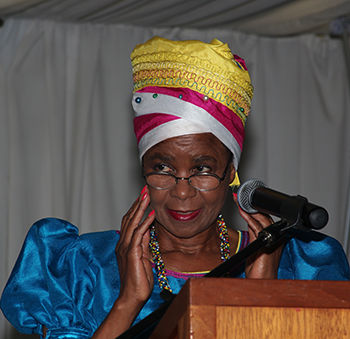
Dr Mamphela Ramphele delivered the seventh Unisa Es’kia Mphahlele memorial lecture on 30 September 2016 in Polokwane.
The seventh Unisa Es’kia Mphahlele memorial lecture commemorated the 1956 Women’s March that sought to address the human and social aspects of our nation. The lecture was delivered on 30 September 2016 in Polokwane by one of the most qualified women and social critics of our time, Dr Mamphela Ramphele, the daughter of South Africa and Limpopo.
In his opening and welcome address, Principal and Vice-Chancellor Professor Mandla Makhanya said “the legacy of Es’kia Mphahlele should continue, as we continue to learn from his great works”.
Delivering the lecture, which she titled Re-Imagine and rebuild education in South Africa, Ramphele said that Es’kia Mphahlele had to be turning in his grave. “He must be distraught about our failure to heed his advice, which is mentioned in his graduation address at Wits University in 1995: ‘In the heat and crush, push and shove, urgency, preoccupations, panic and heartburn of the times, it is easy to lose sight of the essence of the dramatic events and issues that have come to the forefront of our consciousness these days around tertiary institutions. We are also afraid of coming to terms with the burden of our history, which bedevils the education crisis we are in. This crisis, we observe, brings out the ugliest in us as academics, students, workers and administrators, and often belies the best we can bring to the hammer and anvil on which we are currently trying to reshape the present into the future.’”
Ramphele emphasised that, as a nation, we seem to have learnt very little from the lessons of our own history. “Our distress at the violence and destruction of public property, understandable as it is, stands in stark contrast to our failure as a nation to express outrage at the continuing destruction of talent and hope in successive generations of young people. What nation can normalise the theft of hope from so many of its young?”
Her address included the following themes:
- A plea for us to re-imagine our country’s future beyond the fading 1994 dream.
- A proposal for the initiation of an emotional settlement process
- A re-commitment by all as citizens to rebuild our re-imagined country
Ramphele concluded her speech with these words: “We are at a pivotal moment in our history. We have all the ingredients of success. The choice is ours whether we re-commit to re-imagining our country into the great society it can become or continue to hesitate at the threshold of a new brighter future. Coming to terms with the burden of our history would free us to re-imagine ours as a democratic, inclusive prosperous society where everyone celebrates our true unity in diversity. That would be the greatest tribute we can pay to Es’kia Mphahlele.”
The panellists who responded to the lecture were Prof Lesiba Teffo, Director of the School of Transdisciplinary Research Institutes (STRI) in Unisa’s College of Graduate Studies; Ottilia Anna Maunganidze, Senior Researcher in the Office of the Executive Director at the Institute for Security Studies; and Dumisani Hlophe, Governance Specialist at the Unisa School of Governance,. The lecture was moderated by Prof Zodwa Motsa, Director of the Unisa Ethiopia Graduate Office, and excellently directed by Dr Somadoda Fikeni, Advisor to the Unisa Principal and Vice-Chancellor and Director of VC projects.
The evening was completed by the announcement of the winners of the Es’kia Mphahlele Reading and Writing Competition, where the students who won received prizes.
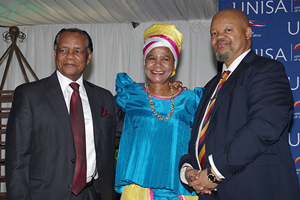
Bernard Ngoepe (Chancellor of Unisa), Dr Mamphela Ramphele, and Prof Mandla Makhanya (Principal and Vice-Chancellor, Unisa) |
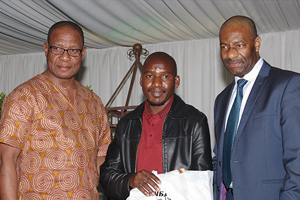
Prof Patrick Mafora (Director: Regional Services, Unisa), Hlatlani Makhubele (Winner: Es’kia Mphahlele Reading and Writing Competition), and Prof Moloko Sepota (Regional Director: Limpopo) |
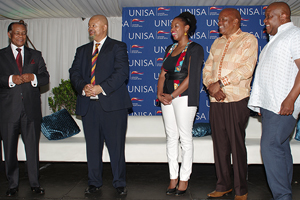
Bernard Ngoepe (Chancellor of Unisa), Prof Mandla Makhanya (Principal and Vice-Chancellor, Unisa), Ottilia Anna Maunganidze (Senior Researcher: Office of the Executive Director, Institute for Security Studies), Prof. Lesiba Teffo (Director: STRI), and Dumisani Hlophe (Governance Specialist: Unisa School of Governance). |

The lecture was attended by all sectors of society, business, government, and representatives from local tertiary institutions. |
Publish date: 2016-10-06 00:00:00.0

 Young Unisa science stars join elite Lindau Nobel Laureate group
Young Unisa science stars join elite Lindau Nobel Laureate group
 Education MEC addresses Unisa autism seminar
Education MEC addresses Unisa autism seminar
 Seven Unisans nominated for the NSTF-South32 Awards 2023/2024
Seven Unisans nominated for the NSTF-South32 Awards 2023/2024
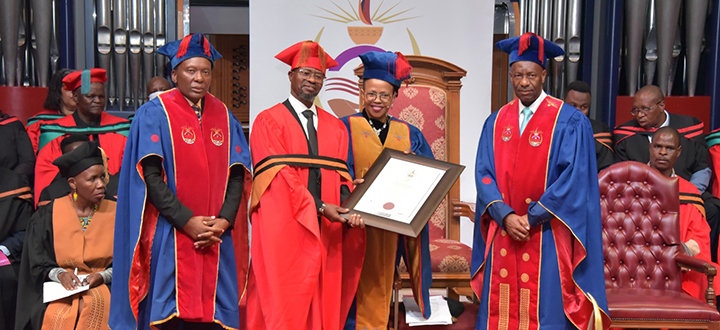 Unisa awards posthumous honorary doctorate to literary maven, OK Matsepe
Unisa awards posthumous honorary doctorate to literary maven, OK Matsepe
 From humble beginnings to academic leadership
From humble beginnings to academic leadership